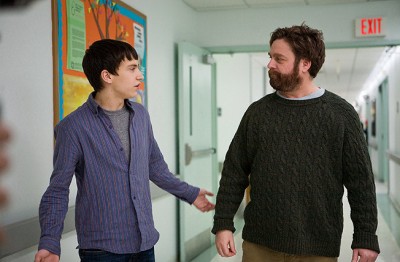It’s Kind of a Funny Story
 Directed by: Anna Boden and Ryan Fleck
Directed by: Anna Boden and Ryan Fleck
Starring: Keir Gilchrist, Zach Galifianakis, Emma Roberts, Jim Gaffigan, Lauren Graham
Rated: PG-13 for mature thematic issues, sexual content, drug material and language.
Sometimes movies come along that aren’t easy to put into one of the neat “good movie” or “bad movie” boxes. “It’s Kind of a Funny Story” is one of those movies. I have a sneaking suspicion that viewers may find it hilarious, touching, sweet, overly simplistic, tragic, quirky, or offensive, or a combination of some of those elements, depending on their own histories with mental illness and their sense of humor.
Craig (Keir Gilchrist) is sixteen and has been depressed for a year. One morning he wakes up, decides to throw himself off the Brooklyn Bridge — and goes to the hospital instead. He’s figuring they can give him a shot or something to snap him out of it so he can go to school tomorrow, but instead he winds up checking into the psychiatric ward, which has a five-day minimum stay policy. For added problems, the teen wing is undergoing renovation, so he’s put in with the adults.
The adults include Bobby (Zach Galifianakis), who takes Craig under his wing. There’s also his roommate, Muqtada (Bernard White), who’s so depressed he hasn’t left the room in weeks, and a host of other patients, each with their own issues. There’s also Noelle (Emma Roberts), a fellow teen who may or may not be as interested in Craig as he is in her.
Gilchrist is pretty spot-on as Craig, making his depression believable without going over the top with it. The film centers tightly around him, and he has the skill to carry it, making his voiceover first-person narration and the strangely-orchestrated flashbacks (which defy description but are a big part of the film’s charm) work. He also has to be the straight man for a lot of the humor in the film, and handles that with aplomb. When playing a character with an intermittent stress-vomiting problem, maintaining dignity is difficult, but Gilchrist manages it. He’s also able to hold his own on screen with Galafianakis, which is no small feat.
Where the film may run into trouble with some viewers is its subject matter; it’s impossible to do justice to mental illness in a feature-length movie with this many characters. Out of necessity, many of the patients in the hospital are one- or two-note characters, and although Craig says in his voiceover near the end that recovering from depression isn’t something simple, the ending seems a little too pat. Some of the dialog suggests Craig has no business being depressed, since he has a nice family and goes to a good school, and little is done to contradict that view. Given that reactions like that are part of why a lot of people never open up about their depression, it disappointed me that it wasn’t handled better in the script.
The film succeeds, however, in showing viewers that having a mental illness isn’t something to be ashamed of. Craig’s therapist tells him early on that depression is a medical condition, and points out he wouldn’t be embarrassed if he had diabetes. Furthermore, just about every person in the film is shown to have their own issues of some sort. Craig bonds with a couple of his classmates when they confess to having depressive episodes themselves, and the friends he makes in the psych ward are people rather than walking diagnoses. Craig’s also commended for asking for help rather than trying to go it alone, another positive message.
If the idea of a quirky comedy about mental illness sounds right up your alley, don’t miss “It’s Kind of a Funny Story.” If the mere idea offends you, stay far away.